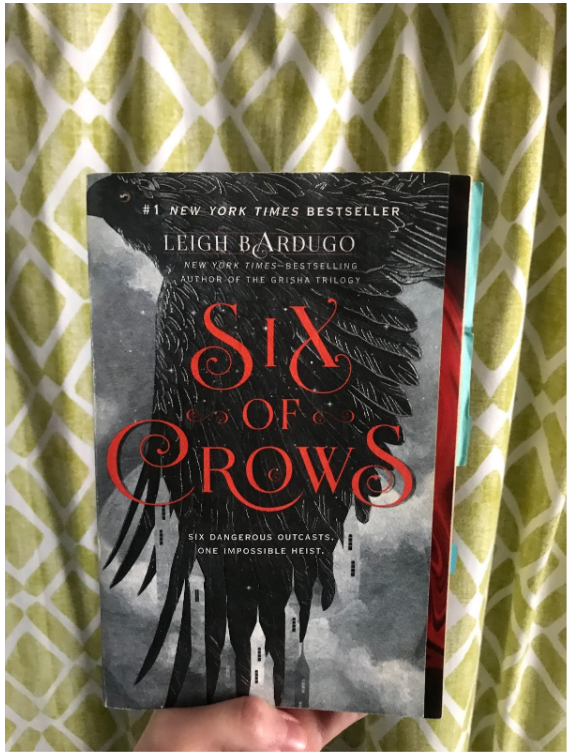Six of Crows is the equivalent of a house of cards on a windy afternoon. Sure, at the beginning it looks impressive, but as time goes on you notice how it’s starting to wobble and about to collapse. The premise and the praise behind it drew me in, a fantasy novel with a magic system in it closely intertwined with the snazzy tones of Ocean’s Eleven? An actual good young adult novel? What was not to like? You know, besides the shoddy worldbuilding, insane amount of coincidences, and haphazard characterisation and implementation of ideas that barely manages to support the story that finally collapses in the sequel.
Six of Crows is a fantasy novel that follows a band of thieves, sharpshooters, convicts and foreigners as they’re hired to do a job of a lifetime. A standard heist story setup, with the catch being that it’s taking place in a fantasy setting. The main attraction is not only that but the cast itself, as the book makes a pretty strong first impression with them. For example, arguably the main character of the series, Kaz Brekker. A teen prodigy that has become one of the most feared criminals in Ketterdam, a shady coastal city inspired by the 17th century Dutch Republic. Kaz’s first impression of the reader is him blackmailing a rival criminal, leisurely ratting off the address of the guy’s lover. A strong first impression, and something that gave me hope that this wouldn’t devolve into another young adult narrative that solely focused on the romance and made every other aspect of the book suffer. This, unfortunately, was not the case.
As the story progresses and we’re thrown into the heist, things start falling apart. Leigh Bardugo attempts to juggle all of the characters, having a set character be the point of view for every chapter. What doesn’t work about this is how it becomes painfully apparent that while Bardugo knows what she wants to do with the characters, she unfortunately doesn’t know where to do that in. Character development solely rests on epiphany’s and eye opening revelations that are set off by the most coincidental of situations. A character was kidnapped and raised in a brothel? She suddenly happens to meet the manager of that brothel in this place that is leagues away from Ketterdam. A character’s secret is revealed? Then he’ll spend the next chapter suddenly musing about his backstory and having life changing revelations when there are people shooting at them. Have some sort of trauma? Oh boy, thank God that according to Bardugo that situations that fit that niche will arise as if summoned by a coked up Stephen King. The same can apply for the story and the heist. It’s hard to take the characters seriously as hardened and intelligent criminals when everytime something goes wrong the solution conveniently slides into center stage after whichever unresolved trauma from whichever character has been resolved.
The worldbuilding is also equally as flimsy. Bardugo tries to flip flop too much and doesn’t accomplish anything on the spectrum. Is it high fantasy or low fantasy? Is it supposed to be gritty or mystical? Are the magic rules supposed to have hard rules, or are they handwaved like in Harry Potter? Because of her refusal to stick to one direction the worldbuilding loses it’s grimy charm once the cast has to leave Ketterdam for the heist. It’s difficult to care about the world around these criminals when none of it is explained organically either. After all, what better time is there to think about the implications of the class divide and discrimination against mages when you’re being pursued by guards who will probably use your flayed skin as a rug. The implications of worldbuilding rest on just reading what’s on the page and not actually thinking about how or why things would function like that in reality. It’s a fantasy novel, but all worldbuilding needs to make sense on it’s own context. Overall, Six of Crows holds promise but fails to uphold it. If one wants to read an actual gritty fantasy Ocean’s Eleven, read “The Lies of Locke Lamora”. In fact, the biggest grievance during reading this was the fact that I wasn’t reading that book instead. Bardugo has some really interesting ideas, but would have benefited greatly from just focusing up instead of trying to cover all bases and failing at most.

Photo: Sarah Buchmann.
